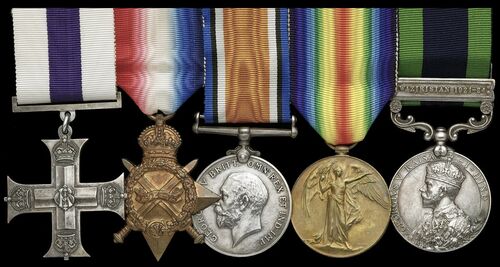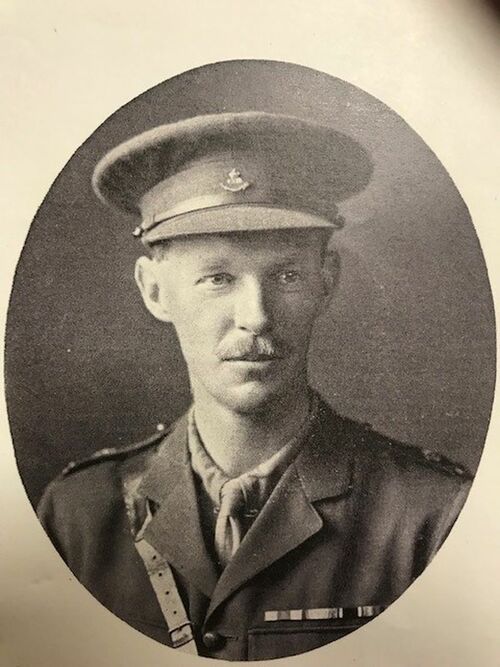Auction: 23003 - Orders, Decorations and Medals
Lot: 271
A superb 'Battle of Shergat 1918' M.C. group of five awarded to Major W. M. Logan-Home, 112th Infanty, Indian Army, who took the surrender and sword of the Commanding Officer of the Turkish Forces
Military Cross, G.V.R.; 1914-15 Star (Capt. W. M. Logan Home, M.C.); British War and Victory Medals (Major. W. M. Logan Home.); India General Service 1908-35, 1 clasp, Waziristan 1921-24 (Maj. W.M. Logan-Home, 3-4 Bombay Grs.), mounted for wear, very fine overall (5)
M.C. London Gazette 26 May 1919:
'For conspicuous gallantry and devotion to duty at Sherqat on 29-30 October 1918. With the greatest coolness he worked up to the enemy's position under heavy fire and over difficult country. Then finding himself out of touch with the battalion, he made a close personal reconnaissance, eventually re-establishing communication. Later, he rendered a valuable report on the local situation.'
William Miles Logan Home was born at Sandgate, Kent, on 6 June 1884. Educated at Loretto, he was commissioned 2nd Lieutenant with the 3rd (Militia) Battalion, King's Own Scottish Borderers on 30 August 1902. Transferring to the 1st Battalion Royal Sussex Regiment at Malta on 2 December 1904. He was to see service with them in India, being posted to Umballa and Solon before transferring to the Indian Army on 1 July 1908.
Joining the 112th Infantry Logan-Home saw service on the Indian Frontier in the Kurrum Valley between 1911-1912. Promoted Captain on 3 December 1913 he commanded of the post at Thal, notably rounding up a party of frontier raiders; and was stationed at Swat in 1915. Entering the war in Mesopotamia between in 1915, Logan-Home remained with his unit and was several times appointed to command the Battalion as Acting-Major throughout 1918.
End of the Fight
The advancing troops at once began to come under shell fire and, about a mile further on, under heavy machine-gun fire as well, the intersecting mullahs, having been well registered by the Turks, being particularly dangerous. The commanding officer of the leading battalion was killed and they were compelled to take up a more sheltered position. The 112th closed up on them but Lieutenant-Colonel Shoubridge, to quote a subsequent official report, 'displaying remarkable calmness and coolness in this very difficult situation, ordered the advance of the 112th to continue'. Heavy machine-gun fire continued to be directed on the massed battalions and casualties were numerous though, owing to their not having halted for any great length of time in the deadly nullahs, the 112th escaped comparatively lightly.
Soon after the advance was resumed Major Bodkin was wounded but continued to direct operations until forced to give up.
The situation had now become exceedingly obscure, the 112th had nothing to guide them and had no idea where any of the other battalions were, while, to add to their difficulties, the smoke and dust from bursting shells made it almost impossible to maintain a proper direction. As a result they veered slightly to their left through this, as it happened, turned out for the best as about half a mile further on they came across some Turks holding a position along the edge of a nullah. The Turks attempted to resist but a bayonet charge by 'C' Company cleared the nullah and took a number of prisoners. At this point the 112th were joined by a British officer and 20 men of the 45th Sikhs who had become detached from the 51st Brigade and had lost their way. A short distance further on another enemy position was located and this too, assisted by the men from the 45th, the 112th charged and captured at the point of bayonet. Two enemy machine guns were captured in this action.
It was now nearly 18:00 and almost dark. The 112th were obviously far in advance of any other British troops and were being enfiladed from both flanks although, owing to the lie of the ground, there was a certain amount of cover. Three hundred yards ahead, down a slight slope, could be seen the enemy's main positions so the battalion proceeded to dig themselves in where they stood. Up till then the 112th had lost some 40-50 men during the course of their advance but casualties ceased as soon s cover was thrown up in spite of the heavy fire which continued to be directed against them from all sides.
Unfortunately there was no means of communicating with the rear as, having commenced the advance in support, the 112th had made over all their signalling equipment to the leading battalion. Consequently Brigade and Divisional Headquarters were not aware that they had reached a position so close to the enemy and deciding from the reverse suffered by the leading battalion that the attack by the 34th Brigade had failed, were about to order a general retirement. It was not until Captain Logan-Home had made his way back to Brigade Headquarters with Lieutenant-Colonel Stourbridge's report that the situation became clarified. The achievements of the 112th were subsequently referred to in orders as a 'a most meritorious performance'.
A general assault on the Turkish position was ordered at about 05:00 on 30 October but before it could be organised the Turks ceased firing and shouting could be heard from all along their line. When day broke it was seen that the Turks had left their trenches and were waving white flags in token of surrender. General Hakkim Bey, Commander in Chief of the Turkish Forces, and a number of other officers gave themselves up to the 112th and were taken back to make a more ceremonial surrender to Lieutenant-Colonel Shoubridge.
The 112th took 51 guns (Two of which were retained as souvenirs), 180 machine-guns and several thousand prisoners after which, having long since passed the normal limits of human endurance, they camped on the spot and enjoyed a well earned rest.
In General Marshall's report on the action at Sharqat he states:-
'The fighting which ensued was of a very severe nature. The hilly ground, intended with ravines and previously prepared for defence, was all in favour of the Turks....... Our difficulties were increased by the sandy nature of the soil which delayed transport and by the absence of water except for the Tigris itself. After continuous fighting the 17th Indian Division forced the Turks to fall back on their third position on the hills covering Sharqat (50 miles due south).'
After the Battle
The ensuing week after the battle of Sharqat was spent cleaning up the battlefield which was covered with the bodies of men and animals, all of which had to be buried. Casualties also had to be evacuated and as the force had advanced some 70 miles and had no proper means of transport many of the wounded suffered badly. Major Bodkin never recovered from the effects of his journey to the base and died a few months later in India.
Captains Meade and Logan-Home commanded the escort over the many thousands of prisoners sent down the line to Fat-Ha and while en route managed to capture some sheep and goats in the hills and so had their taste of fresh meat for several weeks. The remainder of the 112th arrived at Fat-Ha soon afterwards and then moved on to Abu Rajash, one march further down the line, where news of the Armistice was received and where they remained for some weeks building a railway embankment. They then moved to Terkit for Christmas.
An extract from The Logans of Edrom and Broomhouse further mentions Logan-Home's actions in winning the Military Cross 'for specially distinguished services at the Battle of Shergat. He reconnoitred close up to the Turkish trenches, and carried back valuable information alone over difficult ground and under intensive fire at night. He then returned to his trenches, and was near the Turkish line when they surrendered at dawn, after a great bombardment and rifle fire all night. The General commanding the Turks walked over to him, under a flag of truce, and presented him with his sword on surrendering.'
In his private capacity Logan-Home was a distinguished naturalist and a member of the Bombay Natural History Society. While in Mesopotamia, during the Great War, he made a collection of little-known birds and their eggs, and of butterflies for the British and Bombay Museums. He and his elder brother had made a fine collection of British and of Indian butterflies and moths. Also a keen shot he took part in many hunting and shooting expeditions, in India, Kashmir and Baltistan. Logan-Home was a Fellow of the Scottish Zoological Society and a member of the Scottish Pipers Society and St. Andrew's Society and became a Deputy Lieutenant for the County of Berwickshire. He died on 5 April 1977, at Silverwells, Berwickshire.
Subject to 20% VAT on Buyer’s Premium. For more information please view Terms and Conditions for Buyers.
Sold for
£1,300
Starting price
£800







